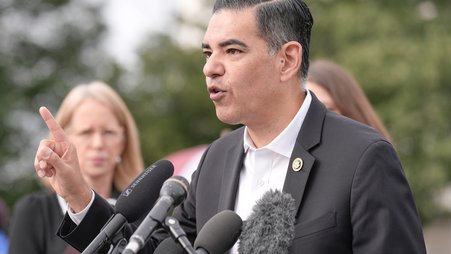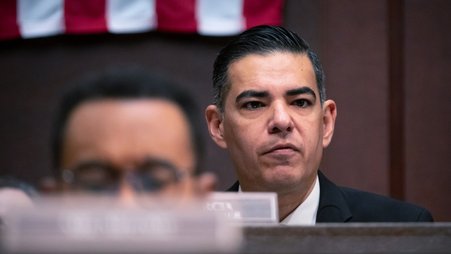We’ve written a lot about why Congress needs to pass the PRESS Act, the bipartisan federal bill that would shield journalists from government spying and from being forced to turn over their confidential sources. Strong protections for journalist-source confidentiality encourage whistleblowers and sources to come forward with newsworthy information that the public might otherwise never know.
But Congress isn’t the only place where we need a law strengthening the reporter’s privilege. A small number of states also lack a reporter's privilege statute. Even though judges in all of these states (except Wyoming) have recognized some protection for journalists’ sources and newsgathering materials, without a law on the books, journalists and their sources are still at risk.
Case in point: Mississippi, where journalist Anna Wolfe and her editor Adam Ganucheau are facing contempt of court for refusing to reveal confidential sources for their reporting in Mississippi Today about a massive criminal welfare fraud scandal.
The investigative series won the Pulitzer Prize. Among other things, it revealed that former Gov. Phil Bryant guided Brett Favre, the former NFL quarterback, on how to secure welfare funding for a volleyball stadium at University of Southern Mississippi, where Favre’s daughter played.
In response, Bryant sued — not over the original reporting, which he hasn’t contested, but over after-the-fact characterizations of the investigation. As part of his lawsuit, Bryant has demanded not only Wolfe’s sources for this investigation but all of the communications that every Mississippi Today reporter has had with sources about him for the past several years.
Mississippi has no law protecting reporter-source confidentiality, but most trial courts in the state have recognized the privilege. Still, because those decisions aren’t binding on other courts, Mississippi Today, Wolfe and Ganucheau have been forced to ask the Mississippi Supreme Court to recognize a reporter’s privilege for the very first time.
Unless and until the court rules in their favor, Wolfe, Ganucheau, and all Mississippi reporters are vulnerable to chilling demands for their sources.
So are journalists in other states without a reporter’s privilege written into state law. Relying on courts to develop and apply a judge-made privilege can lead to gaps, confusion, and weaker protections.
Mississippi isn’t the only state that lacks both a codified reporter’s privilege and a decision from the state’s highest court recognizing one. The Missouri Supreme Court, too, has yet to recognize a reporter’s privilege, though the state court of appeals has done so several times. That puts journalists in Missouri in a precarious position.
Even in other states where the highest court has spoken, court-made privileges can lead to gaps in the law or confusion, especially if that court has issued very few decisions discussing the privilege. Because courts make decisions on a case-by-case basis and decide only the issues before them, an application of the reporter’s privilege in one set of circumstances may not resolve the question of its application in another. This lack of certainty can discourage sources from coming forward, because they can’t be sure whether or not the law will protect them.
The Virginia Supreme Court, for example, has just one decision recognizing the privilege, and only in criminal cases. While lower courts in the state have determined that the privilege also applies in civil cases, those decisions aren’t binding on other lower courts or the state Supreme Court. A statutory reporter’s privilege could make clear that it applies in both criminal and civil cases, and to demands both from the government and from private litigants.
Individual state court decisions may also leave other questions about the privilege open: Does it apply only to confidential sources or also to other confidential or nonconfidential newsgathering materials? Does it protect freelancers or citizen journalists? Is it absolute or qualified, meaning it can be overcome in certain circumstances? In contrast, a codified reporter’s privilege can address these and other details, giving journalists and sources the certainty they need about when they can rely on the privilege.
Finally, court decisions can always be limited or even overturned in later cases, making them less durable than a statutory protection. The Idaho Supreme Court, for example, initially entirely rejected a reporter’s privilege, only to change its mind in its 1985 decision in In re Wright. According to one expert, however, “In its most recent examination of the privilege, the Idaho Supreme Court has again indicated a hostility toward the privilege and strictly limited the ruling in Wright.”
Although statutes can also be repealed, lawmakers may be reluctant to undo popular shield laws knowing they’re accountable to the electorate.
It’s good that courts in states without a statutory reporter’s privilege have stepped in to protect journalists and sources. A judge-made privilege is better than nothing. But lawmakers in those states shouldn’t be satisfied to sit back and rely on this precedent to protect the press.
We need every state in the country, as well as Congress, to pass strong shield laws that comprehensively protect journalists from being forced to turn over their notes and reporting materials or otherwise burn their sources. The free press and the public’s right to know is too important to leave the decision up to the courts alone.





